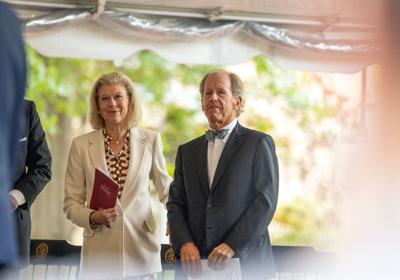The retired energy CEO who gave $75 million to the University of South Carolina last week once turned heads for walking away from $5 billion. It would pay off — but not without first testing his resolve. Peter McCausland didn't study business or finance at USC.
He's a liberal arts history major, a product of the class of '71. The Philadelphia native left Columbia for law school in Boston before finding his niche — and fortune — in the arcane industrial-gas distribution business. McCausland didn't set out to create the fifth-largest company of its kind in the world.

But that he did after spotting a timely crack in a fragmented market in the early 1980s, when the then-corporate-merger lawyer with a penchant for bow-ties pulled together $5 million to buy a small gas distributor as a family investment. Recognizing that almost half the highly localized industry was made up of mom-and-pops, he launched Airgas Inc. Over the next three decades, McCausland would stitch together hundreds of acquisitions to build his startup into a publicly traded 800-pound gorilla based in Radnor, Pa.
Along the way, he earned a footnote in history, at least among the Wall Street M&A crowd. Hostile environment It was 2009, amid the rubble of the Great Recession, when he took a call from Air Products & Chemicals. The rival, also based in Pennsylvania, wanted to buy out McCausland and his shareholders for $5 billion.
He took the deal to his board of directors, who rejected it as too cheap. They also added a so-called poison pill to their corporate bylaws that effectively blocked outside investors from acquiring more than 15 percent of the stock. The following year, the bid turned hostile as Air Products looked for ways to seal the deal.
The company took its all-cash offer directly to shareholders, who voted to remove McCausland and two other directors from the board. Their seats were filled by Air Products' nominees. McCausland stood his ground and fought back.
The dispute was moved to a Delaware court, where the Airgas founder and CEO won, against long odds. The poison-pill strategy was upheld on appeal. Air Products, which by then had raised its original offer by $800 million, withdrew the bid in early 2011 and moved on.
"The case preserved the ability of companies to defend themselves against hostile takeovers, without input from shareholders," according to a New York Times account of the precedent-setting legal battle. McCausland, whose defense of Airgas during the thwarted takeover was featured in a book titled " Merger Masters: Tales of Arbitrage ," explained his resistance to sell to Air Products during a 2013 appearance on CNBC . "They made the bid at a very low point in the economy — the worst recession since the Depression," he told host Jim Cramer.
"We knew our business would rebound, and we knew that we had invested a lot of money for growth and that the growth would come. And sure enough it has." The economy was in far better shape in 2015, when Airgas agreed to be sold to France's Air Liquide in a deal that paid shareholders about $10 billion, or double the contested offer from a few years earlier.
The USC history major's stake in the business was estimated at about $1 billion. Staying true McCausland and his wife, Bonnie, and their family have been true to his school over the years. A gift announced almost a decade ago helped launch a brain imaging center to support USC's focus on neuroscience research.
They also established a faculty fellowship at his alma mater in 2014. During last week's ceremony, USC described the latest donation as "transformational" as it renamed the College of Arts and Sciences in honor of McCausland. The gift will provide annual internship stipends for 150 students, fund neuroscience research and support faculty recruitment, retention and fellowships.
McCausland, who retired from Airgas as executive chairman in 2016, lives in Florida and still owns a home near his Philadelphia stomping grounds. The philanthropist described Wednesday's occasion, held at the university's historic Horseshoe, as a full-circle moment. “I was 16 years old when I first walked onto this campus, and I was far away from my home in Pennsylvania," McCausland said .
"I can assure you that I wasn’t thinking at that time that I might be standing up here under these circumstances 59 years later. Our gifts reflect my gratitude for the many gifts this university has bestowed upon me and our desire to see this university grow and prosper.".
Technology

USC's $75M benefactor once snubbed $5B — and it paid off handsomely

Peter McCausland built Airgas Inc. into the fifth-largest company of its kind in the world. He also delivered to his shareholders after beating the odds and fending off a high-profile hostile takeover attempt.















